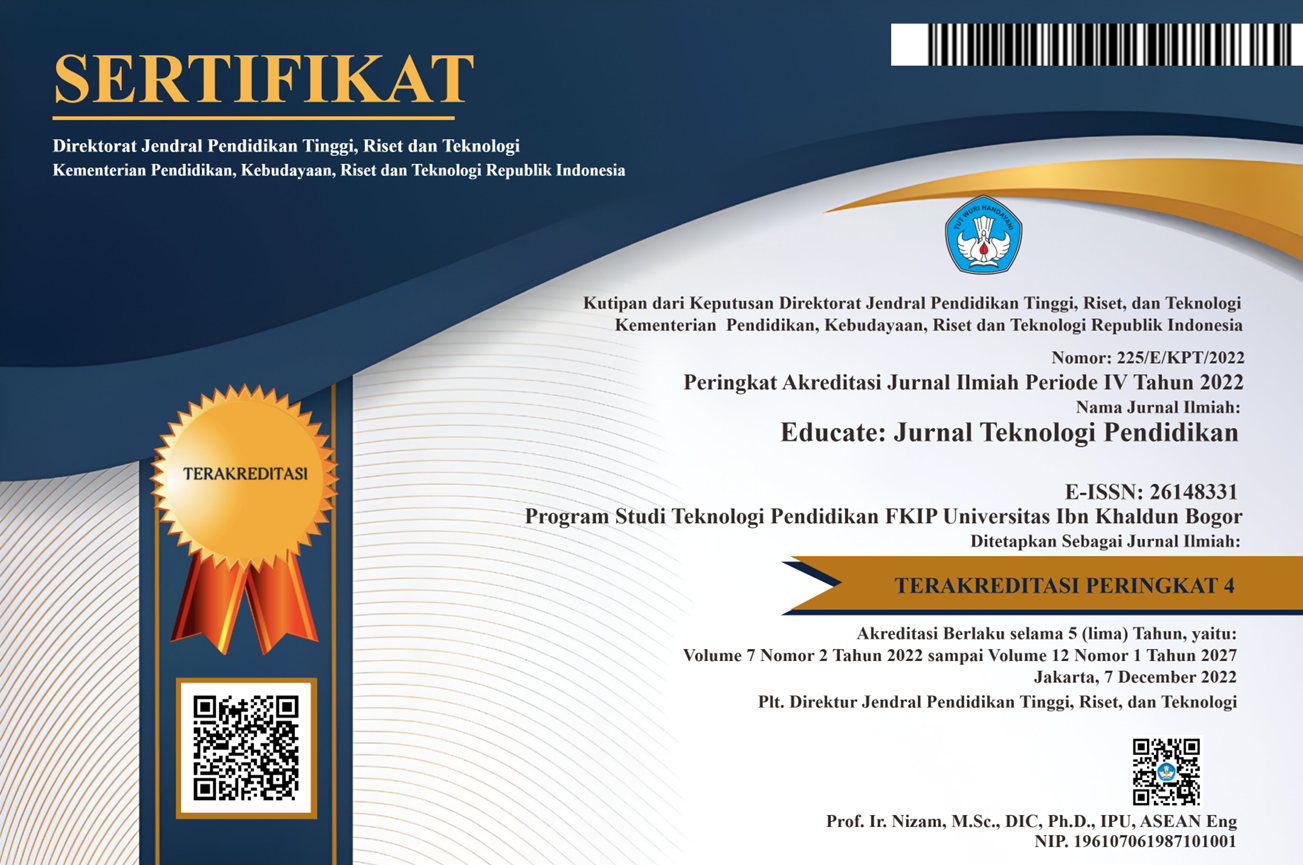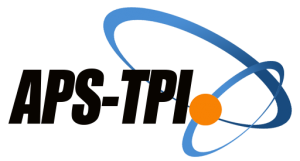IMPLEMETATION OF EXPERIENTIAL LEARNING IN IMPROVING COLLAGE STUDENTS' CRITICAL THINKING SKILL
PENERAPAN EXPERIENTIAL LEARNING DALAM MENINGKATKAN KEMAMPUAN BERPIKIR KRITIS MAHASISWA
DOI:
https://doi.org/10.32832/educate.v10i1.18785Keywords:
experiential learning, kemampuan berpikir kritis, mahasiswaAbstract
This study aims to describe the implementation of Experiential Learning in the course of using media and learning resources in improving students' critical thinking skills. In line with the objectives of the study, this study is included in descriptive research whose data is collected by conducting documentation studies, observations, interviews and distributing questionnaires. The study was conducted with respondents of two groups of Educational Technology (UNJ) undergraduate students in the fourth semester (4), academic year 2023/2024. This study produces procedures or guidelines for implementing EL in the course of using media and learning resources. Learning in the course of using media and learning resources that applies Experiential Learning takes place effectively through a continuous cycle of experience, reflection, conceptualization, and experimentation.
References
Anggara, Ari & I Komang. 2012. Pengaruh Model Pembelajaran Experiential Learning Terhadap Konsep Diri dan Pemahaman Konsep Fisika Siswa Kelas X SMA Negeri 4 Singaraja. Singaraja.
Dabamona, S. A., & Cater, C. (2018). Understanding students’ learning experience on a cultural school trip: Findings from Eastern Indonesia. Journal of Teaching in Travel & Tourism, 1-18. https:// doi.org/10.1080/15313220.2018.1561349
Foo, S. C., & Foo, K. K. (2022). Purposeful Field Trip: Impact on Experiential Learning Opportunities and Critical Thinking Skills. Pertanika Journal of Social Sciences and Humanities, 30(1), 1–30. https://doi.org/10.47836/pjssh.30.1.01
Huisman, J., Kiviaho-Kallio, P., & Lyon, D. (2019). Enhancing employability through experiential learning and reflective learning. In Conference Proceedings: The Future of Education International Conference. Filodiritto Editore. http://doi.org/10.26352/D627_2384-9509_2019
Jose, S., Patrick, P. G., & Moseley, C. (2017). Experiential learning theory: The importance of outdoor classrooms in environmental education. International Journal of Science Education, Part B, 7(3), 269-284. https://doi.org/10.1080/21548 455.2016.1272144
Kolb, A., & Kolb, D. (2009). Experiential learning theory: A dynamic, holistic approach to management learning, education and development. In S. J. Armstrong, & C. V. Fukami (Eds.), The SAGE handbook of management learning, education and development (pp. 42- 68). SAGE Publications Ltd. https://www.doi. org/10.4135/9780857021038.n3
Nurhasanah, S., Malik, A., & Mulhayatiah, D. (2017). Penerapan Model Experiential Learning Untuk Meningkatkan Keterampilan Berpikir Kritis Siswa. 2(2), 58–62.
Oliver, C., Leader, S., & Kettridge, N. (2018). Birmingham Bog outdoor laboratory: Potentials and possibilities for embedding field-based teaching within the undergraduate classroom. Journal of Geography in Higher Education, 42(3), 442-459. https://doi.org/10.1080/030982 65.2018.1455816
Passarelli, A. M. (2016). Using experiential learning theory to promote student learning and development in programs of education abroad (ORBH Working Paper 9/13/2011). Stylus Publishing. https://weatherhead.case. edu/departments/organizational-behavior/ workingPapers/WP-11-03.pdf
Saepuzaman, D. (2016). Penerapan Model Pembelajaran Inkuiri Abduktif Untuk Meningkatkan Keterampilan Berpikir Kritis dan Penguasaan Konsep Siswa Pada Materi Dinamika. Jurnal Penelitian dan Pembelajaran IPA, 2(2), 176-185.
Scarce, R. (1997). Field trips as short-term experiential education. Teaching Sociology, 25(3), 219-226. https://www.jstor.org/stable/1319398
Sharlanova, V. (2004). Experiential learning. Trakia Journal of Sciences, 2(4), 36-39.
Published
How to Cite
Issue
Section
License
Copyright (c) 2025 Mita Septiani

This work is licensed under a Creative Commons Attribution 4.0 International License.
| Authors grant the journal copyright of the work licensed under CC-BY-SA or The Creative Commons Attribution–ShareAlike License that allows others to share the work with an acknowledgement of the work's authorship and initial publication in this journal. | Penulis memberikan hak cipta karyanya kepada jurnal yang dilisensikan dengan CC-BY-SA or The Creative Commons Attribution–ShareAlike License yang memungkinkan orang lain untuk menggunakan karya dengan pengakuan kepengarangan karya dan publikasi awal dalam jurnal ini. |









